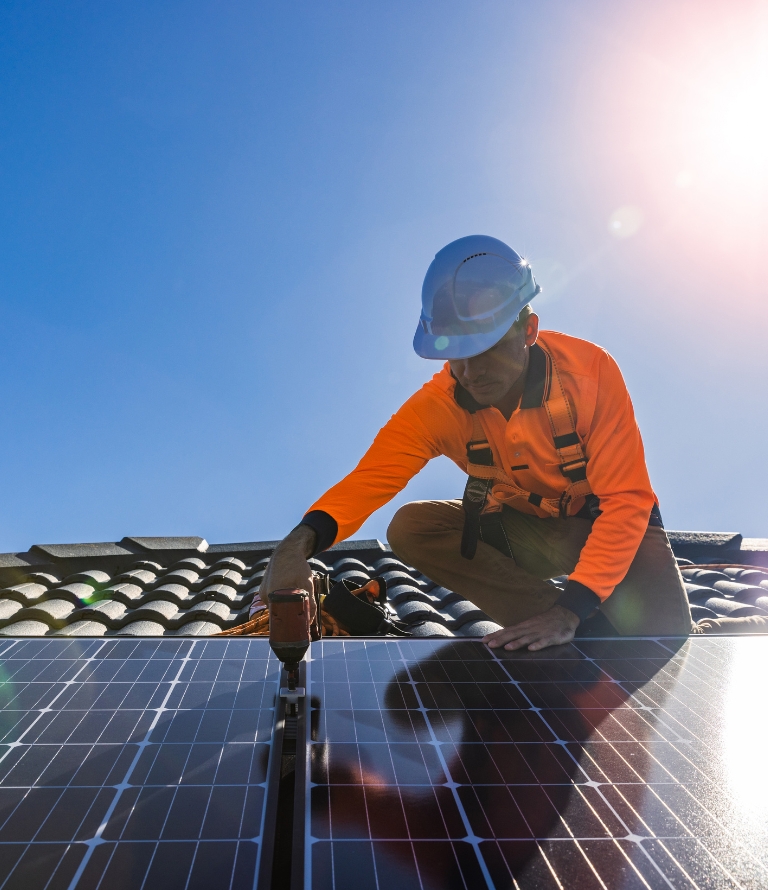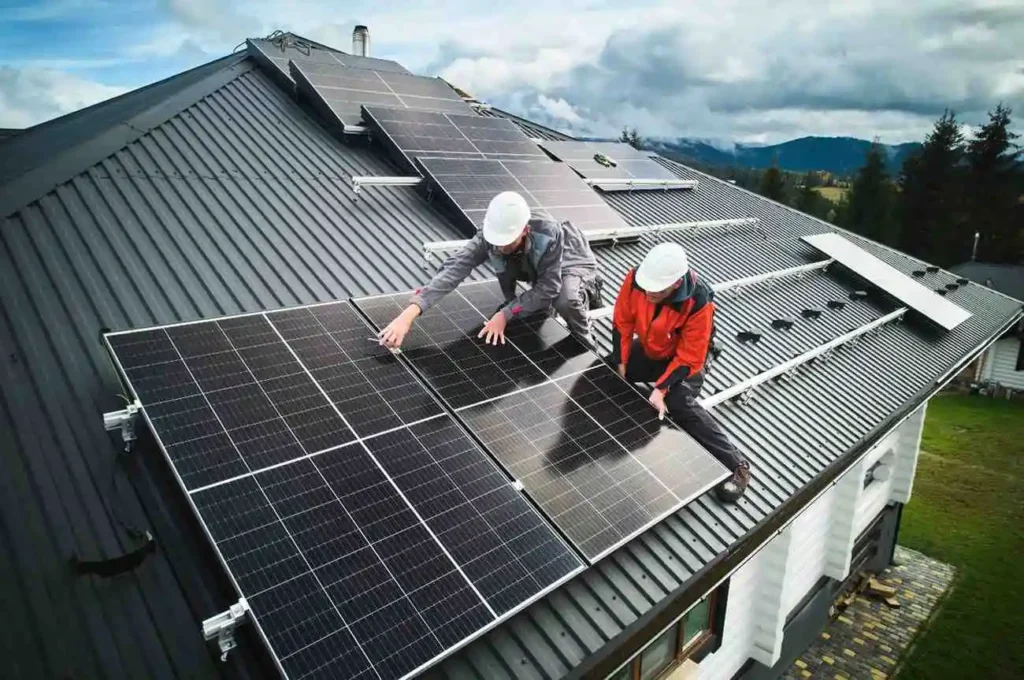In Virginia, the solar industry has been experiencing significant growth, driven by a mix of favorable state policies and an increasing awareness of sustainable energy options. Companies like Cosmo Solaris are at the forefront, offering a range of services from residential installations to large-scale commercial projects. The state’s commitment to renewable energy, reflected in incentives like the Virginia Solar installers Renewable Energy Credit (SREC) program and various tax benefits, has created a robust market for solar investments. Additionally, Virginia’s diverse climate, with its mix of sunny and cloudy days, makes it an ideal candidate for solar energy solutions, promising both environmental benefits and long-term savings for homeowners and businesses alike. As more Virginians seek to reduce their carbon footprint and energy costs, the Solar Company in Virginia industry is poised for continued expansion and innovation.

Ready to shine bright with savings? Going solar in Virginia is more compelling than ever! With a growing number of sunny days each year—averaging around 205—Virginia provides ample opportunity to harness the sun’s energy. By switching to solar, you could slash your electricity bills by up to 70%, thanks to incentives like the 26% federal tax credit and Virginia’s Solar Renewable Energy Credit (SREC) program. Plus, with installation costs dropping by nearly 30% over the past decade, there’s never been a better time to make the leap. Embrace solar power now and join thousands of Virginians who are not only reducing their carbon footprint but also boosting their home’s value. The sun is shining—why not let it work for you?
According to the Virginia Solar Survey, the state has seen significant growth in solar energy over the past six years, with more than 50 utility-scale solar facilities now in operation. During the same timeframe, Virginia has added 23,000 distributed solar installations, including rooftop panels on buildings. The survey also highlights ongoing interest, with 109 out of 133 localities reviewing a total of 279 applications for large-scale solar projects. Of these, 148 were for utility-scale projects of 5 megawatts or larger, with 106 receiving local approval. Additionally, 131 applications were for smaller community-scale projects, ranging from 500 kilowatts to 5 megawatts, and 76 of these were approved. While the survey doesn’t specify how many projects have completed state-level approval, it notes that Southside and Central Virginia have been particularly attractive to solar developers, accounting for 61% of all large-scale solar applications due to their favorable terrain and affordable land, similar to how construction estimating services Florida help builders plan projects effectively in high-demand regions.

In Virginia, solar installation is a pivotal step towards enhancing sustainability and reducing carbon emissions. The state’s increasing adoption of solar energy systems is making a notable impact on environmental conservation. For example, a typical residential solar system in Virginia, with a capacity of 6 kilowatts, can offset approximately 8,500 pounds of CO2 annually. This is equivalent to removing about 7 cars from the road each year. Over a 25-year lifespan, these systems collectively prevent around 210,000 pounds of CO2 emissions. On a larger scale, if 100,000 Virginia homes were to adopt solar energy, the collective reduction in carbon emissions would be akin to planting approximately 50 million trees. With Virginia’s growing commitment to renewable energy and supportive policies, solar power is becoming a key player in the state’s efforts to achieve a cleaner, more sustainable future.
When comparing commercial and residential solar installations in Virginia, the differences are quite striking. Over the past six years, Virginia has seen substantial growth in both sectors, but they cater to distinct needs and scales.
We offer a free inspection and on-site engineering assessment before you commit. Our visit ensures you receive an accurate quote, reflecting our commitment to transparency.
Cosmo Solaris is a leader in commercial solar installations, empowering businesses to take complete control of their energy production and management efficiently.
Several factors influence the cost of installing solar panels, including:
The total capacity of the solar array, typically measured in kilowatts, directly affects the overall price.
Costs may fluctuate based on seasonal demand and availability of installation crews.
Installation costs can vary based on the complexity of your roof and any necessary upgrades or repairs.
The need for extra components like inverters, battery storage, or mounting systems can add to the overall cost.
The choice between different types of solar panels (e.g., monocrystalline, polycrystalline, or thin-film) can affect the price.
Your geographical location impacts both the cost of installation and potential local incentives or rebates.
Cosmo Solaris is making waves in Virginia’s solar market with its innovative and tailored approach to solar energy solutions. Unlike many competitors, Cosmo Solaris offers a unique blend of cutting-edge technology and personalized service, ensuring that each installation is optimized for both efficiency and aesthetics. Their offerings include high-efficiency panels that promise exceptional performance even in varying weather conditions, and advanced energy storage solutions that maximize the benefits of solar energy around the clock. Additionally, Cosmo Solaris stands out with its comprehensive customer support, providing detailed consultations and seamless installation processes. They also offer flexible financing options and leverage state and federal incentives to make solar adoption more affordable. With a focus on both residential and commercial sectors, Solar Company in Virginia Cosmo Solaris is committed to delivering high-quality, customized solar solutions that cater specifically to the needs of Virginians, making it a standout choice in the state’s growing solar industry.
Cosmo Solaris has made a remarkable impact in Virginia’s solar market, successfully completing over 100 installations across the state. This impressive milestone underscores their expertise and commitment to delivering high-quality solar solutions tailored to the diverse needs of Virginian homes and businesses. Each project reflects Cosmo Solaris’s dedication to precision, efficiency, and customer satisfaction, as they utilize cutting-edge technology and innovative practices to ensure optimal performance and reliability. By achieving this milestone, Cosmo Solaris not only highlights their growing presence in the state but also reinforces their role in advancing Virginia’s transition to renewable energy. Their proven track record of successful installations stands as a testament to their ability to meet and exceed customer expectations, contributing significantly to the state’s sustainability goals.
Cosmo Solaris is a trusted solar company that provides quality solar systems, great customer service, and reliable setups. It is known for offering efficient and eco-friendly energy solutions.
At Cosmo Solaris in Virginia, solar installers usually make $40,000 to $60,000 a year. Pay depends on skills and experience, and they can earn more with bonuses and extra hours.
Standard systems shut down during outages for safety. But we offer battery backup systems that keep your lights on even when the grid goes down.